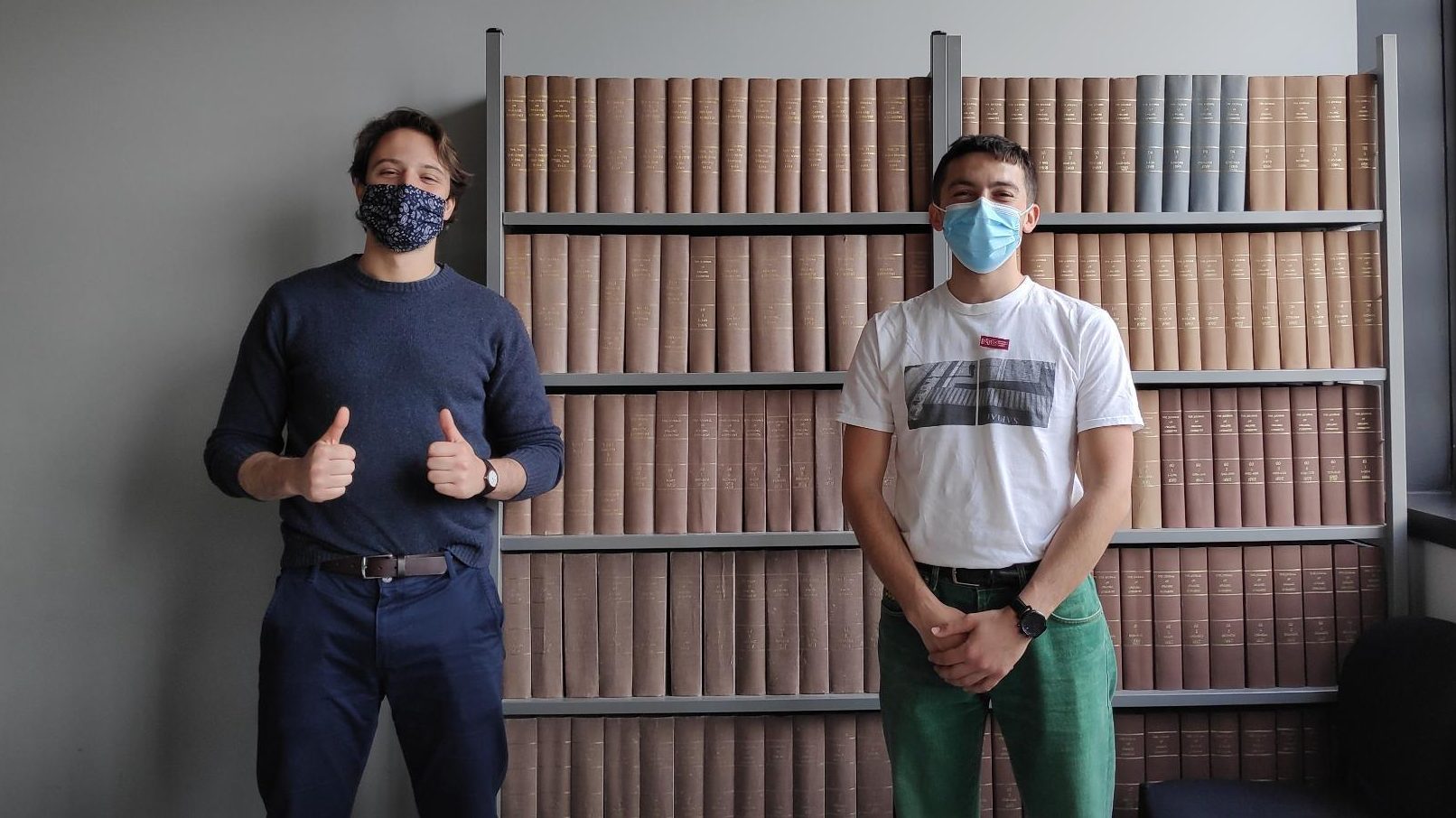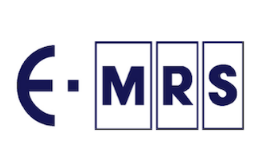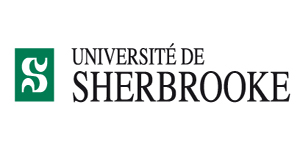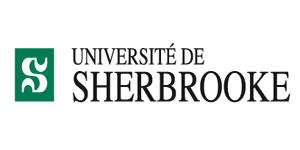Baptiste Rouchié, a PhD student in a CIFRE thesis allying Air Liquide HealthCare, ITODYS and IMRB, agreed to conduct this interview at the end of a project lasting several months with a group of EIDD students, including Louka Yilmaz, on the search for ways to synthesize artificial skin in order to support him in his thesis work.

Baptiste Rouchié and Louka Yilmaz
in our laboratory partner premises, ITODYS.
© Paris MRS/E-MRS Chapter
What is your current professional status?
I am currently working on a CIFRE thesis, a project funded by a company. I am working on a collaboration between 3 laboratories: the Explore Center of Air Liquide HealthCare, the laboratory of the Mondor Hospital in Créteil IMRB (Mondor Institute of Biomedical Research) and the laboratory of the Université Paris Cité ITODYS (Interfaces Treatments Organization and Systems Dynamics). The objective of this project is to use additive manufacturing methods (3D printing, inkjet printing, screen printing) to design a test bench for medical devices.
How is your research topic based on materials?
What I do is completely related to materials. The methods used are based on research in materials. As for the applications, they bring knowledge in the biomedical field.
What does it mean to be in a thesis?
First of all, there is no typical day. That’s what I like about it too. Every week I work on my project. Depending on the tasks, I go to the relevant labs. Whether it’s to acquire knowledge, build and develop devices or test them.
What are the specificities of the private/public partnership of the CIFRE thesis?
The biggest advantage is to have a link between academic research and research for a business-related application, which in this case makes it possible to improve patients’ lives. Moreover, as the project is innovative, there is a contribution of knowledge that will remain within the team and if a patent is filed, it will be shared between the different components. Finally, the collaboration brings visibility to everyone and allows to widen the fields of activities thanks to the developed knowledge and specialities.
In the case of the CIFRE thesis, is it necessary to produce a marketable product at the end?
The objective is to have a finished project. Marketable it is not sure, but which in any case will make it possible to carry out the test benches.
What is your educational background?
Before entering the EIDD (Denis Diderot Engineering School), I did the intensive preparation courses for the Grandes Ecoles entry exam named CUPGE (University Preparatory Cycle for the Grandes Ecoles) at the University of Paris Diderot (now Université Paris Cité). This training, compared to the classical CPGE (Preparatory Cycle for the Grandes Ecoles), allowed me to develop my autonomy and my work rigor because we were more left to ourselves.
Why did you choose to do a thesis after your studies?
I wanted to be able to see all the ins and outs of my project over a period of three years, while at the same time acquiring skills in the various fields that revolve around my project. I knew the field that I liked but it is above all the realization of a project from A to Z and the challenge of the thesis that made me opt for this project.
What does your background bring to the realization of your thesis?
Beyond the scientific knowledge, being the only one responsible for my work and gravitating between 3 instances of which I am the link, it is necessary to be autonomous.
Coming from an engineering school, was it difficult to orientate yourself towards a thesis?
No, it was very natural. My engineering training did not lock me into a set career path. I did an internship at the end of my second year in an academic laboratory and my end-of-study internship in a mixed unit: half in an R&D center and half at CNRS. This last internship introduced me to the world of the CIFRE thesis and doctor-engineers. These experiences reinforced my desire to do a thesis.
To find your thesis, was being an engineer a positive or negative point?
I don’t think that there is a prohibitive path between engineering school and master’s degree. They are different profiles that both have advantages and disadvantages. It is rather the vision that you have of the project and how you will apply your knowledge that is important. In my case, it was my experiences that allowed me to find my thesis.
To get to where you are now, do you think that a bachelor-master course would have been more beneficial to you?
No, first of all because my training did not push me to be an engineer by profession but also because it brought me knowledge and working methods that I use today for my project. An academic course would have surely brought me different things, but I don’t regret my course at all.
At the end of your thesis, is it possible to continue your project with the company and would you like that?
It’s possible, but it remains to be seen under which formula, if there is still a collaboration with the university it will be more complicated. At the end of the three years, I might want to change projects or vary the fields, but for the moment I’m more focused on the present and trying to finish in time. Nevertheless, one of the advantages of the CIFRE thesis is that it allows me to meet people in companies to have contacts and continue if we are interested.
At the end of the thesis, do you plan to work for a company?
Yes indeed, that’s what happens at the end of a CIFRE thesis. I don’t know of any CIFRE doctoral students who have gone on to a university position after their thesis, so I don’t know if it happens.
What would you say to someone who is hesitating to embark on a career in materials research?
What I like about materials is the multidisciplinarity and the many broad and varied fields of application. And it’s also a challenge for tomorrow’s world with innovative materials that will help solve economic and environmental problems, etc. I don’t see any negative points in this field unless, of course, the person isn’t interested in doing research. It is a very interesting field, among many others.
À lire aussi

First Joint European MRS Chapter workshop
The Paris MRS Chapter is glad to organize the first joint European MRS Chapter workshop in collaboration with Cologne/Germany, Hasselth/Belgium and Genova/Italy MRS Chapters in Paris. From 19th to 22th March, you will have the chance to share and discuss...

PhD project – Biomaker parameters identification for food allergens detection
PhD project in Canada Position DescriptionHealth Canada requires the food industry to declare 10 allergens and gluten sources on food packaging. Given the growing number of tests required, and the high cost of allergen detection methods such as...

PDF Project – Biomarker parameters identification for food allergens detection
Proposal for a postdoctoral fellowship in Canada. Position Description Health Canada requires the food industry to declare 10 allergens and gluten sources on food packaging. Given the growing number of tests required, and the high cost of...

PhD project – Signals quantification of Raman probe for allergen detection
Proposal for a PhD project in Canada Position Description Health Canada requires the food industry to declare 10 allergens and gluten sources on food packaging. Given the growing number of tests required, and the high cost of allergen detection...
